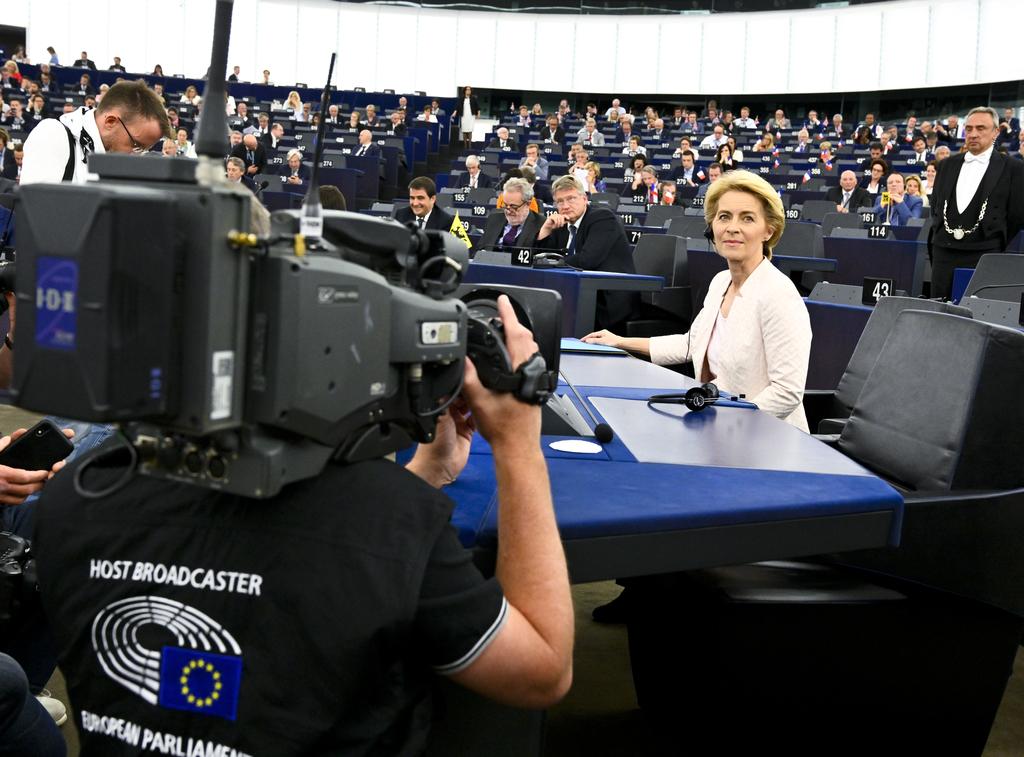Congratulations to @vonderleyen! Looking forward to close cooperation to make #EU stronger and more united.
— Krišjānis Kariņš (@krisjaniskarins) July 16, 2019
Von der Leyen received 383 votes of 733 votes in the European Parliament with 374 required to secure a majority. 327 MEPs voted against her candidacy. In addition there were 22 abstentions and one blank vote.
Благодаря! Hvala! Děkuji! Tak! Bedankt! Thank you! Aitäh! Kiitos! Merci! Danke! Ευχαριστώ! Köszönöm! Go raibh maith agat! Grazie! Paldies! Ačiū! Grazzi! Dziękuję! Obrigada! Mulțumesc! Ďakujem! Hvala! ¡Gracias! Tack! pic.twitter.com/J4GEgY1UJY
— Ursula von der Leyen (@vonderleyen) July 16, 2019
More details of von der Leyen's biography and her proposed program for Europe can be read at the European Commission website.
Of Latvian MEPs, Roberts Zīle of the National Alliance said in advance of the vote that he would not be supporting von der Leyen, saying he was "disappointed" by her offerings and suspicious of moves towards a federal Europe.
Last week von der Leyen talked about the importance of subsidiriaty and taking into account the views of Member States.But it took you 30 minutes to mention it today.Instead we heard about transnational lists and removing vetoes on foreign policy. This is not what Europeans want. pic.twitter.com/YLxZbKvMtf
— Roberts Zīle (@robertszile) July 16, 2019
The National Alliance also has a mandate in the hands of MEP Dace Melbarde.
In contrast Ivars Ijabs of the Development/For! party signaled he would be supporting von der Leyen, listing ten reasons why.
Noformulēju 10 iemeslus, kāpēc es šodien balsoju par Urzulu @vonderleyen kā @EiropasKomisija priekšsēdētāju.
— Ivars Ijabs (@ijabs) July 16, 2019
Lasi vairāk: https://t.co/4frVnSh7nw pic.twitter.com/nlzUuNUKf4
Andris Ameriks of the Harmony party confirmed he had voted in favor of von der Leyen. His party colleague Nils Ušakovs remained silent on social media before and after the vote.
Today I voted for the new President of the European Commission!
— Andris Ameriks (@AndrisAmeriks) July 16, 2019
We all have a new work stage! pic.twitter.com/i90befylv8
von der Leyen came from within the European People's Party bloc in the European Parliament, and was supported by Sandra Kalniete and Inese Vaidere of New Unity, which is also affiliated to the EPP. Vaidere offered congratulations and posted a picture of herself with von der Leyen.
Apsveicu Urzulu fon der Leieni (@vonderleyen) ar ievēlēšanu @EiropasKomisija vadītājas amatā, nomainot līdzšinējo prezidentu @JunckerEU.
— Inese Vaidere (@IneseVaidere) July 16, 2019
Par viņas kandidatūru balsoja 383 deputāti, kas ļāva viņai kļūt par pirmo sievieti šajā amatā. pic.twitter.com/5tLkCTXQgl
There was no immediate indication which way Tatjana Ždanoka of the pro-Kremlin Latvian Russian Union had voted, though the Group of the Greens/European Free Alliance with which she is affiliated had voiced opposition to von der Leyen's candidacy and promisedto vote against.
However the election itself was by means of a secret ballot so the voting record of MEPs cannot be confirmed by the public. The new President is set to take office on 1 November 2019 for a five-year term.
The Commission President-elect will now send official letters to the member states' heads of state or government inviting them to propose their candidates for members of the Commission. Hearings of the nominees in Parliament’s competent committees are scheduled to take place from 30 September to 8 October. The full college of Commissioners then needs to be elected by Parliament, most likely in its 21-24 October session. More information here.





























